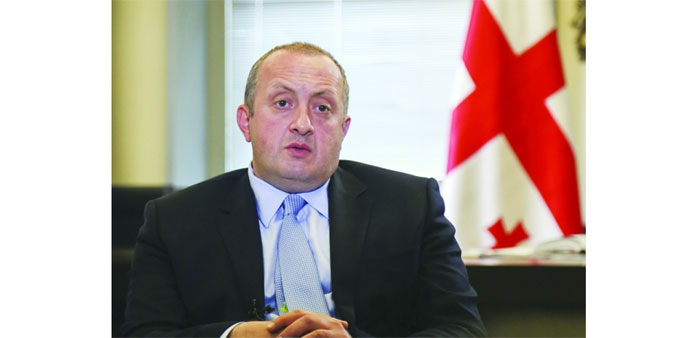By Margarita Antidze, Reuters/Tbilisi
Russia's intervention in Ukraine has left Georgia more worried about its own security, especially as the former Soviet republic was itself invaded by Russian troops six years ago, Georgian President Georgy Margvelashvili said.
The president said that Georgia was planning to sign an accord in June on strengthening ties with the European Union, despite the fact that the prospect of Ukraine concluding a similar accord unleashed the crisis there.
"We don't feel ourselves secure, because some of the basics of the way that nations communicate with each other have been put under question," Margvelashvili told Reuters in an interview late on Monday, commenting on Moscow's actions in Ukraine.
"Georgia, which experienced very harsh Russian foreign policy moves six years ago, and which is still in a very complicated relationship with the Russian Federation, is naturally very alarmed because of the Ukrainian precedent," said Margvelashvili, 44.
Russian forces entered Georgian territory in August 2008.
Moscow said it was an operation to protect people in the separatist territory of South Ossetia from attacks by Tbilisi's troops, while Georgia and its Western allies accused Russia of an act of aggression.
Many Western politicians say Russia's intervention in Georgia was a dress rehearsal for Ukraine's Crimea Peninsula, which was annexed by Moscow after it sent in troops.
Georgia had been due to sign the EU agreement along with another former Soviet republic, Moldova, by the end of this year.
However, EU leaders agreed earlier this year to aim to have the deals sealed by June because of fears that the two countries could come under Russian pressure.
Late last year Ukraine's president Viktor Yanukovych came close to signing an association agreement with the EU, but backed off under pressure from Moscow.
Pro-European Ukrainians, angered by his change of mind, staged weeks of protests that eventually forced him out, setting in motion a sequence of events that led to Russia's military intervention in Crimea.
Georgia has strategic importance because it is on the route of pipelines which carry oil and gas from the landlocked Caspian Sea – seen by many countries as an alternative to Russian energy – to world markets.
While Tbilisi has a long-term ambition to join Nato, its bid for membership has effectively been on hold since the 2008 war.
Russia is opposed to Georgia joining the alliance.
But the Crimean crisis has put back on the agenda the question of whether Georgia, a country of 4.5mn people, might eventually be admitted into the alliance.
A Nato summit in September is scheduled to discuss the position of four countries – Georgia and the former Yugoslav republics of Montenegro, Macedonia, and Bosnia – under the alliance's "Open Door" policy.
"We do believe that the summit in Wales will be a response to all the attempts that the Georgian government and people of Georgia ... have made for integration into Nato," Margvelashvili said. "We are a small country with limited military resources, but we have shown that we are a credible partner when it comes to international security."
Margvelashvili said the world should try to rein in Russia's intervention in Ukraine by using "a calm and rational approach".
"Russia should not be alienated. It should be restrained by engagement," he said.
A similar approach would allow Georgia to improve relations with Russia, he said.
"The Ukrainian case has added more negative aspects to our dialogue with Russia than positive, but our policy remains firm and it's very consistent," Margvelashvili said. "Our attempt to draw our relations into a dialogue is not yet very successful, but we believe that it has potential."
He said he was ready to hold talks with any Russian representatives, including President Vladimir Putin, to find a solution.

